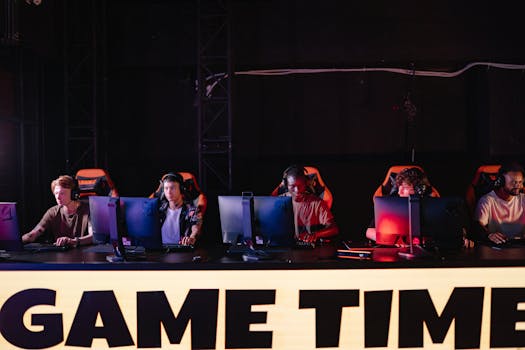Ever notice how fast a group chat lights up when someone mentions a new game? Gaming draws people in, inspiring laughter, quick thinking, and collaboration—even among total strangers online.
Whether after-school esports or virtual meetups with faraway friends, games have grown into unexpected training grounds for real-world teamwork. The shared hunt for loot or epic victories can boost skills beyond just quick fingers.
This guide explores how you can use gaming—digital and tabletop—to shape communication, trust, and leadership. Let’s dive in, discover hidden benefits, and find practical tips to turn play into a tool for growth.
Games as a Foundation for Shared Goals
Team-based games, from strategy board games to online shooters, unite groups behind common objectives. Even when competition gets fierce, the drive to win motivates improved coordination, quick decision-making, and focused communication.
Working together in a game is a lot like preparing a meal with friends—everyone brings a skill, covers gaps, and celebrates the final result, regardless of individual differences.
- Multiplayer games foster cooperation through role assignments and shared missions, requiring active listening.
- Puzzle games spark teamwork by challenging players to combine unique skills or perspectives to solve complex problems.
- Competitive arenas demand synchronized actions where success is impossible without trust and real-time feedback.
- Role-playing games encourage players to negotiate, compromise, and plan as a group to progress the storyline.
- Party games break the ice, helping quieter members participate and find their place in the group.
By making goals feel achievable or thrilling, games draw out each person’s strengths and highlight the importance of every role on the team.
Building Communication Through In-Game Challenges
One evening, four friends joined an escape room adventure in a virtual game. They quickly learned that constant chatter led to missed clues, so they developed a simple system: listen first, then respond. The group started to breeze through challenges.
Consider the trio attempting a difficult raid; the most talkative player realized timing and tone mattered more than volume. Clarity helped teammates anticipate actions, leading to better results and fewer misunderstandings.
Another group of cousins set a rule: each person had to describe their approach before acting. This encouraged patience, improved explanations, and let shyer players step forward with ideas that saved the game.
Effective teamwork in games depends on more than fast reflexes. Moments like these teach players what works in-game—listening, concise language, and sharing plans—work well off-screen too.
Navigating Roles and Responsibilities Virtually
Assigning roles within a game room mimics the dynamic of an office team or sports squad. Understanding how to switch and adapt can improve trust, satisfaction, and success, both online and in real life.
- Designate a team leader: someone providing direction and resolving disputes keeps everyone aligned.
- Rotate support roles: healing, scouting, or gathering intel allows everyone to contribute and discover new strengths compared to always playing offense.
- Define clear goals: clarifying the team’s mission, as with workplace projects, makes priorities easy to remember and effort more focused.
- Share information regularly: just as project updates are vital in business, real-time status checks prevent confusion and support timely teamwork decisions.
- Troubleshoot mistakes together: discussing setbacks openly—without blame—mirrors constructive team problem-solving in any group work scenario.
- Alternate leadership and support: switching who calls the shots gives everyone empathy for different roles and broadens skill sets.
- Compare styles: a group that shifts between aggressive and cautious play learns to appreciate diversity, and builds flexibility for different teamwork situations in life.
Using in-game roles as learning opportunities means everyone discovers the value of being both leader and support, sharpening empathy and adaptability.
Adapting to Setbacks and Managing Conflict
Gaming isn’t always smooth sailing. Sometimes, a team faces repeated defeat or clashes over tactics, making emotional management crucial for moving forward, much like disagreements in school or at work.
Let’s compare one match where a loud argument broke out mid-battle, leading to poor performance, with another where players paused, discussed calmly, and adjusted. The difference? Teams that manage conflict quickly are more likely to bounce back stronger.
| Scenario | Team Response | Outcome |
|---|---|---|
| Heated disagreement | Blamed one member | Continued losing, low morale |
| Open discussion | Heard all ideas | Found new strategy, improved odds |
| Ignored issues | Let problems build up | Team broke apart |
These scenarios show that acknowledging mistakes and collaborating on solutions in games can mirror healthy ways to manage conflicts beyond the screen.
Translating In-Game Teamwork to Real-Life Projects
Think about a puzzle game where players split duties—one researches clues, another tests solutions. This echoes how classmates divvy up parts of a group presentation or volunteers organize a community event together.
Just as game tactics shift based on the team’s strengths, assigning tasks in real life based on who excels at what often leads to better results. It’s like matching positions in sports to each player’s abilities.
In both games and workplaces, adaptability is key. Players who quickly adjust strategies during play often carry that agility into group projects, replacing frustration with creative problem-solving.
Additionally, winning or losing as a team shapes attitudes toward shared responsibility. Success feels sweeter when everyone contributes, and mistakes become learning moments rather than failures.
Core Habits That Strengthen Gaming Groups
- Create clear communication rules so no one feels left out during critical moments of the game.
- Practice positive reinforcement—celebrate creative plays and improvements, not just big wins.
- Meet and debrief regularly, even for casual games, to reflect on what worked and what might be tweaked.
- Rotate team roles intentionally to appreciate diverse talents and foster empathy for each player’s responsibilities.
- Maintain flexibility; a team ready to shift tactics quickly responds better to setbacks and changing challenges.
- Encourage constructive feedback, steering conversations away from blame and toward shared solutions after losses.
- Prioritize respect and patience, never forgetting the team’s collective goal over individual frustration.
Building these habits into your gaming sessions makes teams more resilient and prepares everyone for collaboration outside of games too.
Applying good gaming habits outside of play strengthens group work, builds trust, and transforms any collaboration from mere task-sharing into genuine achievement.
Comparing Different Teamwork Scenarios Across Genres
Esports squads rely on rapid communication, yet strategy board game teams win through deep discussion, much like committee meetings. Each gaming genre offers unique lessons, providing insights that translate to various team environments.
Imagine if your workgroup mimicked the high-speed decision-making of a racing game team. Alternatively, what if your club adopted the patient, analytical method found in cooperative puzzle adventures?
Consider a scenario where a class project group uses the flexible role-switching common in online RPGs. What if everyone had the chance to both lead and support across stages?
Final Reflections on Growing Together Through Games
Teamwork developed through gaming isn’t just a byproduct—it’s a skill set that translates directly to everyday challenges and successes.
Shared victories and even well-managed defeats help people build trust, patience, and confidence, whether preparing for a big test or collaborating at work.
By intentionally applying these teamwork lessons from games to real situations, leaders and team members can nurture group resilience and motivation alike.
Next time the group comes together—on or offline—remember: every round is a chance to practice the skills that drive collaboration and achievement far beyond the game session itself.
Whether facing a digital dungeon or a real-world project, teamwork learned through gaming is a powerful foundation for success everywhere you go.

